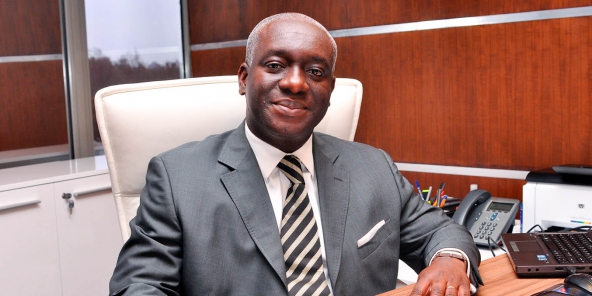The role of the African Guarantee Fund (AGF) is to facilitate access to loans for SMEs, the backbone of African economies. The new Chairman of the Board of Directors, Félix Bikpo explains how the Fund mitigates the economic impact of the Covid-19.
To paraphrase the greatest investor of all time, Warren Buffett, “It’s only when the tide goes out that you can find out who is swimming naked! The Covid-19 epidemic has triggered the equivalent of a tsunami, killing both good and bad companies.”
In these times of crisis, it is natural that organizations like AGF feel the need to assert themselves and demonstrate their value, explains President Félix Bikpo.
He is well aware that the fallout from the epidemic will have a great impact, but he is convinced that with swift action and appropriate measures, its consequences can be durably reduced.
His team, he tells us, is overworked: They have more discussions with the banks than at any other time. “This is a positive sign!”, He comments. “This shows that banks understand the essential role they must play in the economic stimulus package and in supporting the real economy – that is, with SMEs.”
Indeed, African banks are facing a second serious exogenous shock in the space of ten years. The first being the financial crisis which caused a severe global contraction and threatened to bring down the global financial system.
Nonetheless, Félix Bikpo is certain that the financial system, as he did ten years ago, will prove to be quite resilient, “even if it requires concerted action by multiple stakeholders”. Banks themselves, development finance institutions such as AGF, regulators and governments. This “to protect and help the private sector,” he adds.
Large companies, which can use their lines of credit and have greater cash reserves, should be able to weather the storm. “As often, it will be the small businesses, on which our economies depend, that will suffer the biggest shock,” he fears.
“The bottlenecks run counter to the very essence of African economies. These depend heavily on informal markets, street vendors and the informal sector, which is an essential component of trade.”
SME loans today represent, on average, 20% of a bank’s portfolio. Without firm intervention and lasting support for the banks, Félix Bikpo fears that this figure will drop to 2% or 3%, which would be “catastrophic”.
Squaring the circle!
Félix Bikpo was the first director general of the AGF when it was founded nine years ago. He says he accepted the post on one condition: the Fund’s approach to SMEs must be completely different from the practice until then.
The founding shareholders, the African Development Bank and the development agencies of Denmark and Spain, supported this initiative.
“By challenging the entire SME lending model, we have released approximately $ 2 billion in loans to date for this segment of business,” he said. This has been done primarily by helping to reduce the risks associated with lending to SMEs. At the same time, in-depth work was carried out with banks to better analyze and understand the risks of SMEs. Finally, new technologies have been used to modernize and make bank IT systems more efficient.
Thanks to the Fund’s guarantees, banks no longer need to build up excessive provisions when granting loans to SMEs. This greatly expands the number of financially viable businesses for banks. SMEs with sufficient profit margins can benefit much more easily from bank loans, although they have been systematically excluded for lack of sufficient guarantees.
Banks can take advantage of the Fund’s AA rating (by Fitch’s agency) while sharing the risk. The circle has been squared.
Stability then recovery!
Félix Bikpo explains that AGF’s response to the crisis has taken two forms. “The first is stabilization: protecting the existing loan portfolio, to give companies time to build resilience and not to default.”
The second is direct support to help banks increase lending to SMEs in order to boost economic growth. “Banks are inevitably cautious and reluctant to take risks. So we take part of the risk to encourage them to lend, stimulate entrepreneurship and help SMEs to be an engine of growth.”
According to Félix Bikpo, the fund will raise $ 300 million on the markets. This will help leverage $ 1.2 billion in additional loans over the next 18-24 months.
The Fund’s stabilization policy has extended guarantees to include loans disbursed by banks even before the pandemic occurs. AGF thus helps banks restructure loans and provide the necessary support to SMEs.
Is the Fund at risk of losing money because of this? “Yes, recognizes its promoter,” but this is how our business model should work. Will these losses affect the Fund’s rating? “No, he reassures us, we have enough shock absorbers and liquidity.”
This new funding will only strengthen AGF’s position and allow it to further expand its services. “The only source of finance for SMEs are financial services. If SMEs collapse, African economies will collapse,” says Félix Bikpo, stressing the urgency of the matter. “If AGF cannot support the SME sector now, then there is no reason to exist!”
The leader considers that central banks across the continent have, on the whole, “acted decisively and done a great job.” In particular, by offering flexibility in the capital requirements of banks and by extending the period of non-performance of loans. These provisions thus provide more time for banks and businesses to restructure loans and allow the economy to recover.
Time is of the essence!
What businesses need to rebound, he continues, is time. But how long is the unknown. African economies being very varied, generalizations cannot be advocated.
Much will depend on factors such as the lifting of travel restrictions to boost tourism and hospitality, or the speed of the global economic recovery for commodity exporters.
It is estimated that two-thirds of growth on the continent comes from domestic consumption. “The attitude of the consumer will therefore also be critical and it is difficult to predict how quickly consumption will start again,” he considers. Public investment and the role of banks will therefore be essential to boost growth.
Which sectors are most affected by the crisis? “Tourism first,” he says, because of the portfolio of loans in which its banking customers are involved. “Then transport and logistics, but also energy which are particularly affected”.
Although the current situation has tempered some of its ambitions, the organization’s mandate will continue to expand further and further. For example, AGF was chosen by the AfDB and its partners to manage a $300 million fund aimed at increasing lending to women-led businesses.
Having become PCA, Félix Bikpo analyzes the nine years completed at the end of June at the head of AGF. He says his greatest achievement has been “to demonstrate that with a little ingenuity it is always possible to unblock problems that seem intractable at first.”

